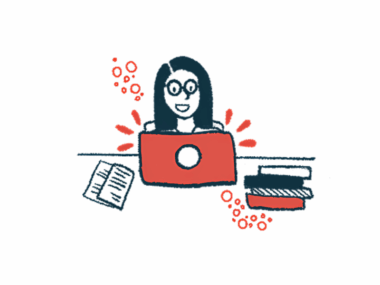My graduate studies help me better understand the effects of ableism
How I'm working to improve access and inclusion in higher education
Written by |

In previous columns, I’ve shared that I’m a graduate student at the University of Texas at Austin, but what exactly does that entail? Almost every time I tell someone I’m pursuing a doctorate in educational psychology, I’m met with the question, “What do you do?” Let’s unpack the answer.
In addition to the foundational classes that students in my program are required to complete, we have numerous research opportunities to explore based on our interests and passions. In short, my academic research is primarily focused on access and inclusion for queer, disabled students of color on college campuses and institutions. My work investigates how a person’s overlapping identities (e.g., race, ethnicity, sexual orientation, gender, disability status, and socioeconomic status) interact with one another, ultimately resulting in unique combinations of discrimination and privilege.
For instance, I’ve faced discrimination on numerous occasions throughout my life, but I can’t always tell if it’s because of my race and ethnicity, gender, sexuality, socioeconomic status, or disability status. This concept is also known as intersectionality.
The societal issues revolving around disability and access are near and dear to my heart as someone who’s been living with relapsing-remitting multiple sclerosis for almost a decade.
The beginning of my research on disability and access
During the last semester of my undergraduate studies, I enrolled in an online course titled “Culture of Disability in Education.” In this class, students learned about the fundamental aspects of critical disability studies and the impact of language on the disabled community.
Around the middle of the semester, Stephanie Cawthon, PhD, the course’s professor, announced a research opportunity for students with disabilities. I’d recently learned that multiple sclerosis (MS) is considered a disability, so I applied for a position on this project.
After a few days, Cawthon informed me that I’d be working as a disabled student coach on the Microsoft-University of Texas Collaborative for Access and Equity. The project involved five disabled student coaches who partnered with faculty members to dissect their courses. Using our experiences with disability and higher education, we had the opportunity to transform classes to better meet the needs of disabled students.
Unpacking ableism
Merriam-Webster defines ableism as “discrimination or prejudice against individuals with disabilities.” Before participating in the collaborative project, I had a basic understanding of this concept. However, it wasn’t until we began delving deeper that I realized ableism can manifest in numerous ways, including language and mannerisms.
Since I was diagnosed with MS in high school, I’ve received a variety of ableist comments, such as:
- “Ew, you aren’t contagious, are you?”
- “You look so healthy and normal.”
- “It could be worse.”
- “You are so inspirational.”
- “It’s all in your head.”
It can be exhausting to navigate hurtful comments on top of all the other challenges that come with MS.
Language and the words we use hold immense power to shape our daily interactions. For that reason, we should all be mindful of what we’re saying and to whom we’re saying it. Avoiding ableist language can help dismantle discriminatory ideologies, foster inclusion and equity, and promote respect.
Recognizing ableism and its effects is critical to understanding the systems of oppression that people with disabilities encounter within our society. To successfully create initiatives for access and inclusion in higher education, I must be able to identify the various manifestations of ableism. By sharing my experiences, I hope to foster change within academia that grants all students equitable learning experiences, regardless of their circumstances.
Note: Multiple Sclerosis News Today is strictly a news and information website about the disease. It does not provide medical advice, diagnosis, or treatment. This content is not intended to be a substitute for professional medical advice, diagnosis, or treatment. Always seek the advice of your physician or other qualified health provider with any questions you may have regarding a medical condition. Never disregard professional medical advice or delay in seeking it because of something you have read on this website. The opinions expressed in this column are not those of Multiple Sclerosis News Today or its parent company, Bionews, and are intended to spark discussion about issues pertaining to multiple sclerosis.



Jerry Smit
The great love of my life lived with good grace despite the most severe form, PPMS, and all that means -- inability to work, power wheelchair fulltime, DMTs mostly ineffective. Before his disability became visible, he heard all the questions and comments this author lists and more, and there were plenty of ongoing, tangible obstacles. He did not bristle, he did not lash out, he did not insist everybody else adjust their "able" existence for him. He did not expect to be the center of attention. He did not want the bully pulpit. His kind nature and determined self-reliance set him apart.
Strangers hoisted his lap-box up to the grocery checkout counter, and altho he did not need this, he'd break out in his killer grin and say thanks. Shoppers asked if he needed something off an upper
shelf, and if it was one of those days when he could not stand briefly, he would cheerfully accept. I never heard him express anger or disdain toward people who asked questions or said something that showed their ignorance about disability or MS. He said to me once, "Before MS hit me, I didn't have reason to know about it either, so I will not think unkindly of them." He gave grace. Of course, this was out in the real world, not a protected, almost artificial space like academia.
Jenny
Your writing makes me think, deeply, about myself now 27 yrs SPMS, And a stroke in basal ganglia, 5/52 ago, so much extra disability. And yet there is a way through that’s better than I can see. Yet.
Thank you Arohanui
Betty Beem
I was diagnosed with RRMS in the early ‘90’s with symptoms for at least 6 years prior to that. MS forced my early retirement from the field of education. I also returned to Texas, my home state. Although my first neurologist persisted in predicting I’d be wheelchair bound by 2000. I’m still not even though I’ve acquired a plethora of comorbidities. I’m currently in the process of starting a ministry for those with hidden disabilities on a bi-platform - in person and on zoom. I feel religious institutions have perpetuated the concept of ableism especially among those whose disabilities are not readily apparent. In preparation I’ve also extensively studied disabilities and theology from a historical perspective as well as current day prevailing attitudes regarding inclusive and to what real extent it actually occurs. I personally feel the spiritual gifts of this unique population have not been tapped nor have the unique social, medical, financial, structural design, emotional, and educational needs been met.